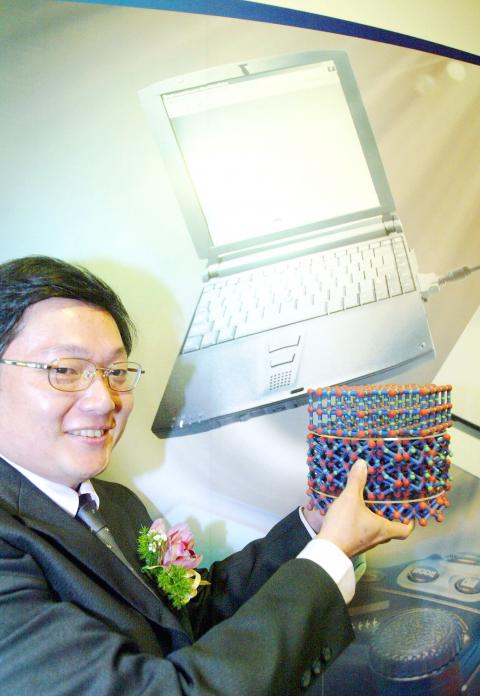Taiwanese scientists yesterday unveiled an advanced microchip technology that they said marks a breakthrough in piling ever more memory into ever smaller spaces.
The scientists said they had succeeded in producing a circuit measuring just 9 nanometers across — 1 nanometer is equal to one-billionth of a meter.
“Researchers used to believe that 20 nanometers was the limit for microchip technologies,” said Ho Chia-hua (何家驊), who heads the team behind the project at the state-run National Nano-Device Laboratories.

PHOTO: CNA
A chip using the new memory technology has about 20 times the storage capacity of memory chips now available on the market and consumes just one 200th of the electricity, the scientists said.
The benefits of greater memory and reduced electricity consumption are highly sought in the manufacture of electronic gadgets like smart phones and tablet computers.
Using such technology, a 1cm2 chip will be capable of storing a million pictures or 100 hours of 3D movies, said Yang Fu-liang (楊富量), the director general of the laboratories.
However, Nobunaga Chai (柴煥欣), an analyst for the Taipei-based electronics market research -company Digitimes, said that it would be some time before anyone would be able to start making money from the new -advanced technology.
“I’m afraid it will take several years before the advanced technology can be turned into -commercial use,” he said.
Taiwan is among the top four microchip producers in the world.

CHIP RACE: Three years of overbroad export controls drove foreign competitors to pursue their own AI chips, and ‘cost US taxpayers billions of dollars,’ Nvidia said China has figured out the US strategy for allowing it to buy Nvidia Corp’s H200s and is rejecting the artificial intelligence (AI) chip in favor of domestically developed semiconductors, White House AI adviser David Sacks said, citing news reports. US President Donald Trump on Monday said that he would allow shipments of Nvidia’s H200 chips to China, part of an administration effort backed by Sacks to challenge Chinese tech champions such as Huawei Technologies Co (華為) by bringing US competition to their home market. On Friday, Sacks signaled that he was uncertain about whether that approach would work. “They’re rejecting our chips,” Sacks

NATIONAL SECURITY: Intel’s testing of ACM tools despite US government control ‘highlights egregious gaps in US technology protection policies,’ a former official said Chipmaker Intel Corp has tested chipmaking tools this year from a toolmaker with deep roots in China and two overseas units that were targeted by US sanctions, according to two sources with direct knowledge of the matter. Intel, which fended off calls for its CEO’s resignation from US President Donald Trump in August over his alleged ties to China, got the tools from ACM Research Inc, a Fremont, California-based producer of chipmaking equipment. Two of ACM’s units, based in Shanghai and South Korea, were among a number of firms barred last year from receiving US technology over claims they have

It is challenging to build infrastructure in much of Europe. Constrained budgets and polarized politics tend to undermine long-term projects, forcing officials to react to emergencies rather than plan for the future. Not in Austria. Today, the country is to officially open its Koralmbahn tunnel, the 5.9 billion euro (US$6.9 billion) centerpiece of a groundbreaking new railway that will eventually run from Poland’s Baltic coast to the Adriatic Sea, transforming travel within Austria and positioning the Alpine nation at the forefront of logistics in Europe. “It is Austria’s biggest socio-economic experiment in over a century,” said Eric Kirschner, an economist at Graz-based Joanneum

OPTION: Uber said it could provide higher pay for batch trips, if incentives for batching is not removed entirely, as the latter would force it to pass on the costs to consumers Uber Technologies Inc yesterday warned that proposed restrictions on batching orders and minimum wages could prompt a NT$20 delivery fee increase in Taiwan, as lower efficiency would drive up costs. Uber CEO Dara Khosrowshahi made the remarks yesterday during his visit to Taiwan. He is on a multileg trip to the region, which includes stops in South Korea and Japan. His visit coincided the release last month of the Ministry of Labor’s draft bill on the delivery sector, which aims to safeguard delivery workers’ rights and improve their welfare. The ministry set the minimum pay for local food delivery drivers at